Comprehensive Guide to Garden Maintenance in Poplar
Introduction to Garden Maintenance
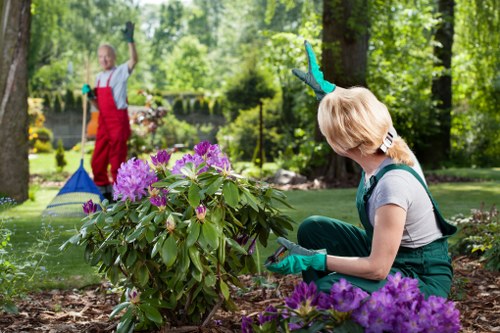
Maintaining a beautiful garden in Poplar requires understanding the unique climate and soil conditions of the area. Effective garden maintenance not only enhances the aesthetic appeal of your property but also ensures the health and longevity of your plants.
Whether you're a seasoned gardener or a beginner, implementing the right maintenance practices can make a significant difference. This guide will walk you through essential tips and strategies to keep your garden thriving all year round.
From soil preparation to choosing the right plants, garden maintenance involves a combination of planning, regular care, and timely interventions. Let’s delve into the key aspects of maintaining a vibrant garden in Poplar.
Understanding Poplar’s Climate
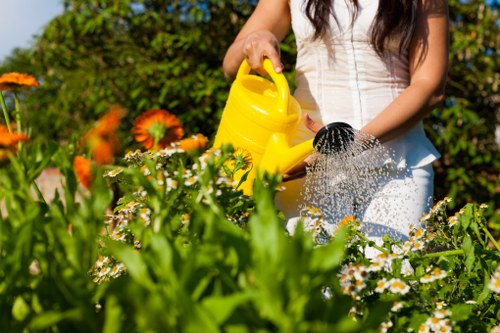
Poplar experiences a temperate maritime climate, characterized by mild summers and cool winters. Understanding the local climate is crucial for selecting plants that can thrive in these conditions.
The average temperature in Poplar ranges from 2°C in winter to 22°C in summer. This variation influences the types of flowers, shrubs, and trees that are best suited for your garden.
Additionally, Poplar receives ample rainfall throughout the year, which affects irrigation needs and soil moisture levels. Proper drainage systems are essential to prevent waterlogging and related plant diseases.
Soil Preparation and Fertilization
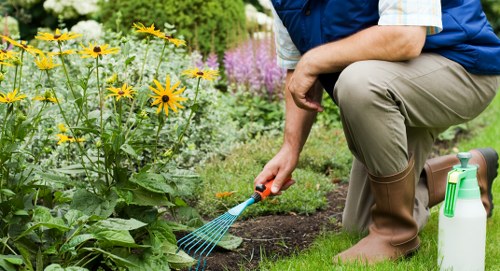
The foundation of any successful garden is healthy soil. Conducting a soil test to determine pH levels and nutrient content is the first step in soil preparation.
In Poplar, soils can vary from sandy to clayey. Amending the soil with organic matter such as compost or manure improves fertility and structure, promoting better root growth.
Regular fertilization is necessary to replenish nutrients. Opt for balanced fertilizers that provide essential elements like nitrogen, phosphorus, and potassium. Organic fertilizers are a sustainable choice that benefits both the soil and the environment.
Plant Selection and Placement
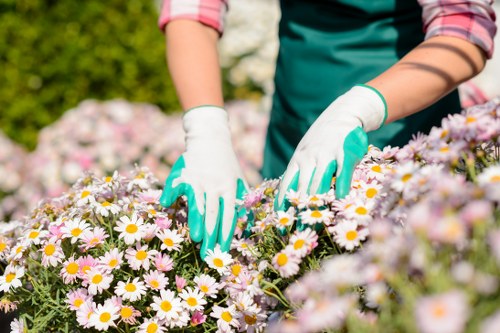
Choosing the right plants is vital for a successful garden in Poplar. Select species that are well-suited to the local climate and soil conditions. Native plants are often the best choice as they are adapted to the environment and require less maintenance.
Consider the sunlight requirements of each plant when deciding on their placement. Some plants thrive in full sun, while others prefer partial shade or full shade. Group plants with similar light and water needs together to simplify maintenance.
Additionally, plan for seasonal interest by selecting a variety of plants that bloom at different times of the year. This ensures your garden remains attractive throughout all seasons.
Watering and Irrigation Techniques
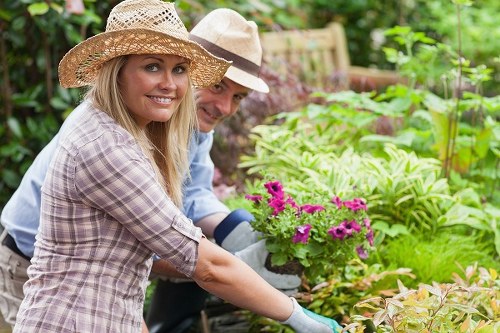
Efficient watering is a cornerstone of garden maintenance. In Poplar’s climate, it’s important to monitor soil moisture levels to avoid overwatering or underwatering.
Implementing an automated irrigation system can save time and ensure consistent watering. Drip irrigation is particularly effective as it delivers water directly to the plant roots, reducing evaporation and water waste.
Mulching around plants helps retain soil moisture, suppress weeds, and regulate soil temperature. Organic mulches, such as bark or straw, also contribute to soil fertility as they decompose.
Pruning and Trimming
Regular pruning is essential for the health and appearance of your garden. It encourages plant growth, removes dead or diseased branches, and maintains desired shapes.
Different plants require different pruning techniques. For instance, flowering shrubs may need pruning after blooming, while fruit trees benefit from annual pruning during the dormant season.
Using the right tools and techniques ensures clean cuts that promote quick healing and reduce the risk of infection. Always sanitize your pruning tools to prevent the spread of diseases.
Pest and Disease Management
Protecting your garden from pests and diseases is a critical aspect of maintenance. Regular inspections help identify issues early before they escalate.
Adopt integrated pest management (IPM) practices, which combine biological, cultural, and chemical methods for effective control. Encourage beneficial insects, use organic pesticides when necessary, and maintain plant health to resist infestations.
Proper sanitation, such as removing fallen leaves and debris, minimizes hiding spots for pests and reduces disease transmission.
Weed Control Strategies
Weeds compete with your plants for nutrients, light, and water, making effective weed control essential for a healthy garden.
Mulching is a natural and effective way to suppress weed growth. Additionally, regular hand weeding or the use of weeding tools can keep unwanted plants at bay.
Cultural practices such as crop rotation and selecting competitive ground covers also help minimize weed proliferation.
Seasonal Maintenance Tasks
Each season brings its own set of maintenance tasks to keep your garden in optimal condition.
- Spring: Prepare beds, plant new flowers, prune shrubs.
- Summer: Monitor for pests, ensure adequate watering, deadhead flowers.
- Autumn: Plant bulbs for next spring, clean up debris, mulch beds.
- Winter: Protect sensitive plants, plan next year's garden, prune deciduous trees.
Adapting your maintenance routine to the changing seasons ensures continuous plant health and garden beauty.
Tools and Equipment for Garden Maintenance
Having the right tools makes garden maintenance more efficient and enjoyable. Essential tools include:
- Pruning shears and loppers
- Spades and shovels
- Garden gloves
- Rakes and hoes
- Watering equipment (hoses, sprinklers)
Investing in quality tools ensures durability and effectiveness, reducing the need for frequent replacements.
Sustainable Gardening Practices
Adopting sustainable practices contributes to environmental conservation and a healthier garden ecosystem.
Composting kitchen and garden waste recycles nutrients back into the soil, enhancing fertility naturally. Using organic fertilizers and pesticides minimizes chemical runoff and promotes biodiversity.
Implementing rainwater harvesting systems reduces reliance on municipal water supply and ensures water availability during dry periods.
Landscaping Ideas for Poplar Gardens
Enhancing your garden with thoughtful landscaping can transform your outdoor space into a stunning oasis.
Incorporate elements such as pathways, garden beds, and water features to add structure and interest. Use a mix of perennials and annuals to provide continuous color and texture.
Consider adding seating areas or a pergola to create inviting spaces for relaxation and entertainment.
Hiring Professional Garden Maintenance Services
While DIY garden maintenance is fulfilling, certain tasks may require professional expertise. Hiring a professional service ensures comprehensive care and expertise in handling complex issues.
Professionals can provide tailored maintenance plans, regular upkeep, and specialized treatments for pests and diseases. They also advise on plant selection and garden design to maximize beauty and functionality.
Contact us today to schedule a consultation and keep your Poplar garden in pristine condition.
DIY Tips for Effective Garden Maintenance
If you prefer to maintain your garden yourself, here are some practical tips:
- Regularly inspect plants for signs of stress, pests, or disease.
- Water deeply and less frequently to encourage strong root systems.
- Remove weeds consistently to prevent competition.
- Use mulches to conserve moisture and improve soil quality.
- Rotate crops annually to maintain soil health.
Implementing these DIY strategies can lead to a flourishing and sustainable garden.
Common Garden Maintenance Mistakes to Avoid
Even experienced gardeners can make mistakes. Being aware of common pitfalls helps in avoiding them:
- Overwatering or underwatering plants.
- Neglecting soil health and not amending it regularly.
- Improper pruning techniques that harm plant structure.
- Ignoring signs of pests and diseases until they are severe.
- Planting non-native species that struggle in Poplar’s climate.
By avoiding these mistakes, you can maintain a healthy and beautiful garden year after year.
Enhancing Garden Aesthetics
Beyond basic maintenance, enhancing the aesthetics of your garden can make it truly remarkable.
Incorporate decorative elements such as garden statues, lighting, and ornamental plants to add personality and style. Using a variety of plant heights and textures creates visual interest and depth.
Consider seasonal plantings to ensure your garden remains vibrant throughout the year. Combining flowering plants with evergreen shrubs provides a balanced and enduring beauty.
Eco-Friendly Garden Practices
Adopting eco-friendly practices not only benefits your garden but also the broader environment.
Reduce chemical usage by choosing organic alternatives and promoting natural predators for pest control. Conserve water through efficient irrigation systems and rainwater harvesting.
Encourage biodiversity by planting a variety of species, including native plants that support local wildlife. Composting organic waste minimizes landfill use and enriches your soil naturally.
Conclusion
Effective garden maintenance in Poplar involves a blend of knowledge, consistent care, and the right practices. By understanding the local climate, preparing the soil, selecting suitable plants, and implementing sustainable methods, you can create and maintain a thriving garden.
Whether you manage your garden yourself or seek professional assistance, prioritizing maintenance tasks ensures your outdoor space remains a source of beauty and joy.
Book your service now and let our experts help you achieve the garden of your dreams in Poplar.

